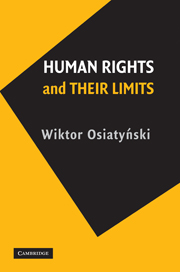Preface
Published online by Cambridge University Press: 05 June 2012
Summary
The ideas that form this book are my most significant learning, gathered from more than 20 years of research and teaching on human rights. My interest in rights extends beyond the past 20 years, however, as I have witnessed firsthand the world around me slowly wake up to the concept of human rights. For that reason, my interest in rights has always had a practical focus, more immediate than theory itself. For me, this book represents a personal culmination of a lifetime's involvement with rights and other values.
My boyhood was spent in the communist Poland of the 1950s, among many schoolmates orphaned by the war and in the ruins of a city burned by the Nazis after the 1943 ghetto and 1944 Warsaw uprisings. Countless former activists were in jail, sentenced for the slightest – or purported – unwillingness to cooperate with the oppressive postwar system. After Stalin's death and the ensuing political thaw, this system became less brutal, but it was still a regime that thwarted freedom at every turn. Most unbearable for intellectuals was the lack of freedom of speech. The state's monopoly over the media, along with the strictest kind of censorship, made it difficult for ordinary citizens to learn the truth, both about “the rest of the world” and about Poland's own history. Communication between people came in whispers, cloaked in fear of being manipulated or overheard by secret police informants.
- Type
- Chapter
- Information
- Human Rights and their Limits , pp. xi - xviiiPublisher: Cambridge University PressPrint publication year: 2009

